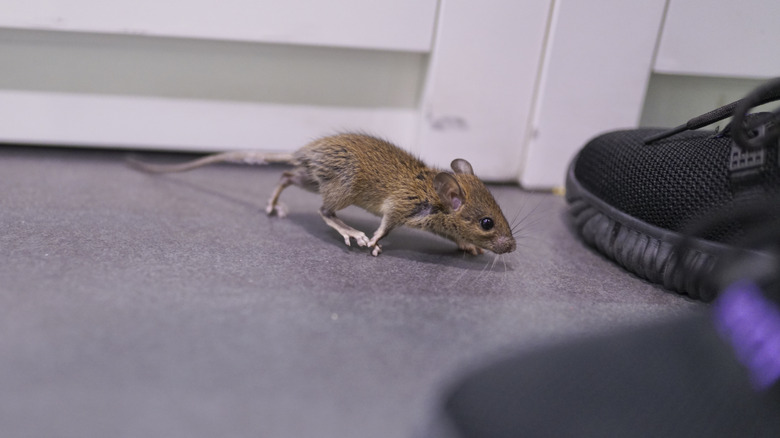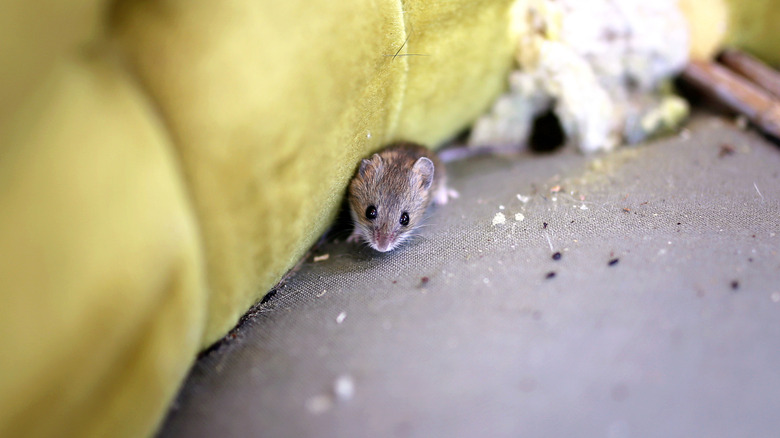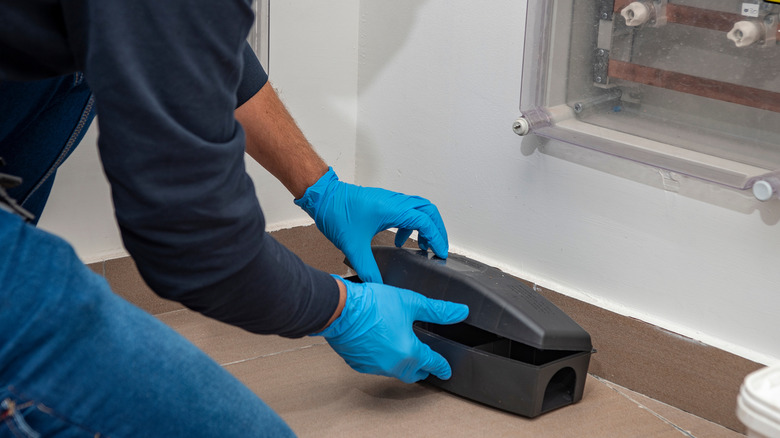Mistakes Everyone Makes When Dealing With A Mouse Infestation
No one wants to discover mice living in the walls. Even worse, you don't want to discover that you've been making mistakes in how you treat the mouse infestation. From using the wrong treatments to exposing yourself to health risks, a lot can go wrong while you try to evict your unwanted houseguests and stop the mouse takeover. Making those mistakes could allow the problem to get worse — female mice birth five to 10 litters per year with an average of six to eight baby mice in each pregnancy. If you're doing the math, that means one female mouse could birth an average of 32 to 56 new invaders in just one year.
Failing to act quickly or waiting it out before you call the pros could cause the infestation to get out of control. It's also a big mistake to ignore the source of the infestation and not deal with that issue. Handling mouse droppings and other contaminated items puts you at risk, so you don't want to skip protection, even if you're just doing basic cleanup. You can also cause further problems with the type of treatments you use and how you use them. Finally, another no-no in treating an infestation is failing to take preventative steps to avoid the situation in the future.
Assuming you only have a few mice
Mice are masters of hiding, often hanging out in wall spaces, behind appliances, and in attics. Is there a hidden mouse infestation if you see only one mouse? The sight of a mouse alone isn't enough information to tell. You need to look for other signs of an infestation to decide how big of a problem you have. One major sign is finding lots of droppings, which look like small, dark grains of rice. Even though mice stay hidden, they don't always stay quiet, so listen for scampering or scratching sounds. You might also notice gnaw marks on or holes, find nesting materials, or smell a stale odor that originates in the areas where mice often hide.
If you don't see many of the signs of a mouse infestation, it could be early in the infestation process. However, seeing even one mouse means there's a way inside your home that needs to be addressed. It could also mean you have other issues that are attracting mice into your home, including overflowing trash, easily accessible food, and tall grass in your yard. Ignoring those issues and just trying to remove the one mouse you see could be a mistake that allows more mice to take up residency inside your home. Address the issue fully by both treating for the mice that are already in your home and fixing the issues that allowed them to get there in the first place.
Not protecting yourself
The thought of mice running rampant in your home is disgusting enough, but knowing the rodents could spread disease makes it worse. Hantavirus is a serious health condition that you can get from rodents. When mice are infected with the virus, their feces, urine, and nesting materials can all spread the disease. That means you could come into contact with the disease pathogens when you have mice in your home.
You'll often find mouse feces and nesting materials near where they breed and nest. Mice could also contaminate your food supply if they chew through packages and leave behind hantavirus germs. As part of your mouse eviction process, you'll likely have to clean up waste, which could expose you to the virus. You're particularly vulnerable when feces or nesting materials are disturbed and become airborne, which can happen when you clean it up.
If you find mouse droppings in the house, protect yourself with long sleeves, pants, shoes, and rubber or plastic gloves. Wearing a face mask or HEPA-equipped respirator reduces the risk of you inhaling the virus. You might also want to wear eye protection. Never sweep or vacuum mouse debris, as those cleaning methods could send the virus into the air. Instead, saturate the area with a disinfecting cleaner or a bleach solution made with one part bleach and nine parts water. After the disinfecting solution sits on the area for at least five minutes, you can carefully wipe it up and dispose of everything in sealed bags. Handling dead mice should be done with just as much caution. Double-seal dead rodents in two plastic bags before disposing of them.
Relying on ineffective treatments or using them incorrectly
If you search for ways to get rid of rodents, you'll likely find an assortment of DIY methods that may or may not help. Commercial products designed to eliminate mice also vary in how well they work. Some people gravitate toward natural remedies to send mice scurrying, but they're not always effective. While mice don't like the smell of peppermint oil, it's likely not enough to make them leave your house completely. They could get used to the smell over time. Ultrasonic rodent repellers also have faults that usually make them ineffective. To truly drive mice out of your home, the frequency would have to be much stronger than what the devices use.
Even standard methods may not work well in some cases. There could be several reasons your mouse traps aren't getting the job done, from improper bait to incorrect placement. Even if you catch a few mice with traps, there could be many more hiding in the walls. Rodent poisons can be dangerous to people and pets in the home if they're used improperly. They can also require several feedings to kill a mouse, so you'll need to keep putting out fresh poison bait to truly take care of the problem.
Trying too many ineffective treatments could let your mouse problem get worse. While you're sprinkling peppermint oil around the house, the mice are continuing to reproduce and chew through items in your home. Many natural treatments might be better used to supplement more effective options, such as trapping the mice in your home and repairing the entry points.
Waiting too long to call the pros
Your first instincts may be to handle the rodent infestation yourself. It seems like the cheapest option, and you don't have to wait for an appointment. But failing to deal with the problem correctly could make it worse. Plus, you could spend a lot of money trying several home products that don't fully resolve the issue, so hiring a professional might not be as expensive as you think. DIY options may work if you catch the infestation early and it's still small, but you also run the risk of it becoming overwhelming quickly.
If you don't know what exterminators really do to get rid of mice, you might make the mistake of thinking they're overpriced and unnecessary. However, they undergo extensive training to understand how rodents behave. This helps them not only choose the best treatment options but also know where to place them to be effective. Safety is also a top priority of professional rodent control services. They know how to use products, particularly poisons, safely to eradicate the problem without causing health or environmental issues. Professionals follow regulations for pest control to ensure the methods are compliant with laws.
Professionals often use integrated pest management strategies, which means they look at the situation as a whole and use several methods to eliminate and prevent rodents from entering your home. They don't just put out traps and poison to kill the mice. They also look for and repair entrance points where mice are sneaking into your home. Many of the products they use are only available commercially, so you won't have access to them with professional help.
Failing to prevent future infestations
To stop another mouse invasion from happening, it's essential to take preventive action to correct the issues that allowed mice into your home in the first place. If you hire a professional, they can show you areas that you can improve to keep mice out. One major step to take is sealing up entrance points. Mice don't need much space to make an entrance — a 1/4 inch is usually a large enough opening for them to fit through. That means even tiny gaps or cracks around your windows, garage doors and other areas could allow mice in. Another vulnerability is areas where utility lines, such as gas or plumbing, enter the home. Seal any gaps and install door sweeps to cut down on entrance points.
Cleaning up inside and outside of your home can also keep mice away. They're drawn to food, water, and nesting materials, so looking for and removing those items or sealing them up can help. The idea is to make your home and yard less attractive to mice so they don't get close enough to enter. Outside your home, keep trash cans and wood piles more than 100 feet from your house to keep mice at a safe distance. Keep your grass short and weeds under control, especially in the areas near your house. Moisture could attract mice, so repair plumbing issues to eliminate this issue. Inside, put food in glass, metal, or heavy-duty plastic containers to protect them from rodents. Cleaning up crumbs and dirty dishes quickly also removes a food source.





